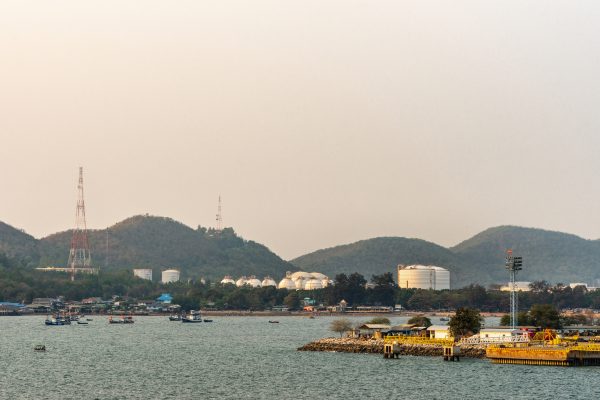Many South Africans have to turn to gas for cooking due to load-shedding. (Photo by: Arterra/Universal Images Group via Getty Images)
“How my family and I prepare for load-shedding is by buying a gas bottle for our stove which costs R400 to fill each month. I don’t always have that money, so some days I have to cook and boil water to bath on an open fire in my backyard,”
South Africa is in a state of crisis because of load-shedding. The outages have left people without power for extended periods — sometimes up to 12 hours at a stretch — adding hardship to their lives. People have had to adapt their lives to deal with this. Home life and work life have had to change to cope with high stages of load-shedding.
The back-and-forth and rumours of a possible total blackout have concerned most South Africans. A grid collapse would be devastating for the country. So, we wanted to find out what that would be like if this happened. We spoke to people who’ve had no power for an extended period — by that we mean for more than a few days — who have an idea of what a total blackout actually means.
Mpho Shidumo, who lives in Diepkloof, Soweto, says they were without electricity for three weeks because a substation in their area blew up.
“It was so challenging but we had to cope. We cooked with an open fire in our yard. We also used an open fire to warm water to bath,” Shidumo says.
Some days, they had to eat bread or buy takeaways just so they could have a meal before they slept. This took a toll on their pockets, which meant they had to find cheap food which is not necessarily the healthiest.
Shidumo says that his older brother bought a stove that uses wood to allow them to cook and bath.
Bridget Ndaba from Ivory Park in Tembisa says they have not had electricity for over a year.
“We were told that the transformer had exploded in our area — this was around March in 2022,” she says.
Ndaba says they have had little to no communication from the authorities about this situation and they have had to find ways to survive.
“The situation is not the best in our area. My family has had to install solar panels so that we can get through our day-to-day home activities,” she says.
Meanwhile her neighbour, Mrs Dlamini, who did not want to give her full name, says the circumstances have been challenging for her and her family.
“How my family and I prepare for load-shedding is by buying a gas bottle for our stove which costs R400 to fill each month. I don’t always have that money, so some days I have to cook and boil water to bath on an open fire in my backyard,” she says.
Dlamini says she has to wash laundry by hand because of not being able to use her washing machine.
“It’s winter now — you can imagine the pain I have to go through washing clothes with my hands in this weather — but that’s the only way,” she says.
They have also had to buy food every day. Their diet now has a lot of tinned food in it because it has a longer shelf life than fresh food.
Thembinkosi Shivambo, from Tswelopele in Tembisa, says they too have been without electricity for a year.
“We were told by our councillor that the transformer in our area has exploded because of cable theft. We understood, as he promised that the situation would be sorted out, but it’s now a year later,” he says.
“I have returned to living as I used to in the village. I do everything on an open fire.”
Shivambo says they have also had to buy food such as meat daily as the fridge does not work. He is forced to buy long-life products, such as milk, canned food and mealie meal.
How people cope with load-shedding
The country has seen a number of days on stage six this year, with talk of unofficially being on stage eight. How do people who can’t afford inverters, solar power or generators survive? How does load-shedding affect their daily routines?
A Tembisa resident, who asked to remain anonymous, who is the grandmother of three girls aged six, seven and 17, says load-shedding has brought her and her family nothing but pain.
“I have a gas stove, so I have to wake up at 4am every day to prepare their lunch as well as water for them to bathe. Straight after that, I have to bath, go to work, and function at 100%, every day,” she says.
Having the EskomSePush app has helped her plan her days around load-shedding and the gas stove means she can cook for her grandchildren and they never go to school having bathed in cold water.
“It is difficult but I try my best to plan ahead. I iron their uniform the night before — if we do have electricity. I pack their lunch the night before, but they do not like that, they like to take fresh lunch to school. I also make sure that, after dinner, we clean the house and do the laundry, so filth does not pile up,” she says.
Jolly Kids
“Sometimes the local substation blows up and we are without electricity for four days at a time. That is the hardest time. So, we make sure we fill our gas bottles for the stove, as well as the heater, to try to make the children as comfortable as possible.”
Matshidiso Ngwasheng, the principal of Jolly Kids, an early childhood development centre in Tembisa, says load-shedding puts a lot of strain for her and her staff. The television and fridge have been damaged by the power outages.
“I now have to put the food for the centre in my personal fridge so it does not spoil,” Ngwasheng says.
“We have to improvise to keep the centre running because we no longer have a TV and the kids have to be visually stimulated. My staff have downloaded all the visual material on their phones for the kids, which is sometimes not practical, but that’s how we have to prepare.”
Their wall-installed heaters run on electricity, which means they have had to buy a gas heater to keep the children warm on cold winter days.
“It is something that scares me so much which is why I make sure that teachers do not leave the classrooms when that gas heater is on, not even for a second, because these young ones are curious and I don’t even want to imagine what could happen,” she says.
When the Mail & Guardian visited the centre, they had already started preparing food — chopping vegetables and parboiling — for the following day to get around load-shedding.
“Sometimes the local substation blows up and we are without electricity for four days at a time. That is the hardest time. So, we make sure we fill our gas bottles for the stove, as well as the heater, to try to make the children as comfortable as possible,” Ngwasheng says.
She wishes the government could at least provide early-childhood centres with solar panels to enable them to handle their day-to-day business safely, especially because they work with children.
Her administrator, Jabu Fani, says he has to come in earlier than usual because he needs to make sure all the schools’ administration is done before the 8am to 10am load-shedding slot.
“This means I have to wake up in the wee hours of the morning to make it to work to make sure I get the important admin out of the way. Sometimes I come in and there is either a power cut or load-shedding, so I have to do things manually.”
Fani also tries to get through the next day’s admin and planning his manual templates in case he needs them during load-shedding the following day.
Meat and liquor
Joseph Madisha, one of the directors of Shi&Ma meat wholesale and liquor traders, says he buys 75 litres of diesel every other day to keep the fridges and other systems running.
A chunk of the business’s profits are going towards the fuel for the generator.
They are starting to prepare for the worst by getting quotations for solar panels to keep the business going.
“We got a quotation for this location, which is three million, and we have three locations. The total for all three locations is about 10 million,” Madisha says.
“I can’t say if the grid will collapse completely but I can say that my partners and I will do all we can to keep this business going.”
What about the middle class?
A 32-year-old programmer, from Midrand, who asked to remain anonymous, says he had to invest in an inverter “because I work from home and I need to be able to connect”.
He bought a 1000-watt inverter for R1 600. If he only plugs in his router, it can last him up to just two days, but if he plugs in his laptop, router, TV and Xbox, it only lasts about eight hours.
“It is convenient because load-shedding lasts for two to four hours at a time, so my life is not entirely disrupted,” he says.
Mr Mhlanga, a taxi owner, who did not want to give his full name, says he has had to beef up his security because of the risk of theft during load-shedding.
“I have always had security but I had to get more security because of load-shedding. People come to my yard and try to steal rims and parts. I also worry about the security of my family because it gets so dark. God knows what is happening in our yards when it gets like this.”
Mhlanga says load-shedding has not only affected him and his family but it has also hit his business.
“Business has been awful. More people are working from home and companies are shutting down. It has caused serious economic strife. I have had to let drivers go and some of my taxis are not operating because fuel prices are also high. All in the name of load-shedding.”
People and business owners are trying their best to keep afloat. They are making plans to get through the rolling blackouts — but it comes at a cost.
“I have never had such a negative relationship with time. I am constantly calculating minutes, hours and days. It is psychologically uncomfortable but we have to keep preparing because, when you are not prepared, everyone you love and yourself suffer. Load-shedding is not fair,” says the grandmother from Tembisa.
Lesego Chepape is a climate reporting fellow, funded by the Open Society Foundation for South Africa.





















Discussion about this post